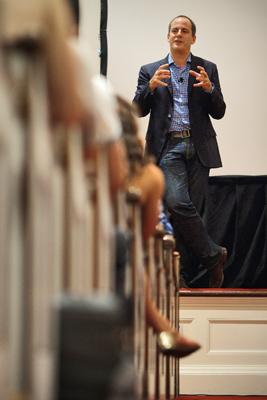By Emily Gold Boutilier
For Showtime executive David Nevins ’88, the most creative moments of his career have often come when he was new on the job.
And that’s no accident, he told the Class of 2016. Delivering the late-August DeMott Lecture to new Amherst students, he said, “When you are in a totally new situation or a new environment, you don’t tend to see the walls; you don’t recognize the limitations. That grasping for structure—‘How do I put together my freshman-year schedule?’ or ‘Who am I going to eat with at Valentine?’—is frequently when the good stuff happens. You’re vulnerable, your defenses are down, you’re open.”

Before he became president of entertainment at Showtime, Nevins was an executive at NBC and FOX, where he played a key role in developing such shows as Law & Order, Will & Grace and The West Wing. In advance of his visit to campus, he assigned the Class of 2016 to read two scripts: the 2011 series finale of NBCUniversal’s Friday Night Lights and the pilot of Showtime’s current hit Homeland.
His lecture featured clips from those two shows. He also talked about how Amherst influenced his career. “What makes this place so great,” he said of Amherst, “is that it’s perfectly designed to help you explore all the intellectual possibilities and to provide the tools you need to make your greatest impact out in the world, once you get there.”
Perhaps most noteworthy were the behind-the-scenes stories he shared about four shows on which he’s worked:
ER: “In my first couple months running drama development at NBC,” he said, “I happened upon an old movie script. Despite the fact that it was 20 years old, I decided to champion it, and that became ER, which was a game-changing series at NBC and probably the single biggest hit I’ll ever have in my career.”
Arrested Development: “Ron [Howard] … and I began a conversation about what he was liking on television. … The show we talked about—the big phenomenon that summer—was the MTV show The Osbournes. We began to discuss: could you make a comedy utilizing the cheap production style of a reality show and use the money you save to pay for a big ensemble of actors?”
Friday Night Lights: “There’s nothing that TV fans like to complain about more than the finales of their favorite shows. What we didn’t want to do is the cop-out ending of, ‘Hey, man, life just goes on’ (ahem, Sopranos) or, ‘Wow that was some crazy, trippy ride’ (uh, Lost, Seinfeld). We wanted to do honor to the trajectory of the characters and reward fans for their loyalty without resorting to a fake sense of closure.”
Homeland: “[In the original script] Carrie Matheson was a bad-ass operative, and she certainly wasn’t suffering from any bipolar issues. Sgt. Brody was a clear-cut villain with well-established bad intentions. … [In bringing it to Showtime, we] focused on making Carrie more ambiguous, more fallible and less reliable—that’s where the idea for her mood disorder came from. We also worked to really humanize Brody, to create sympathy for him, so that the whole show became more ambiguous.”
Photo by Rob Mattson